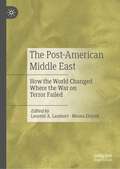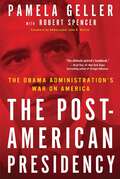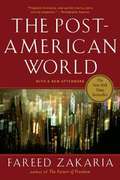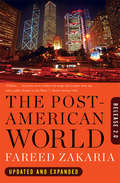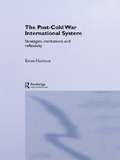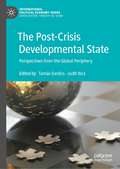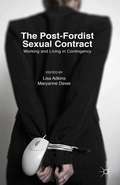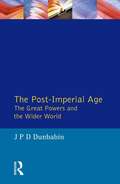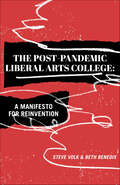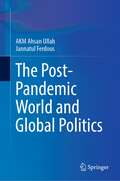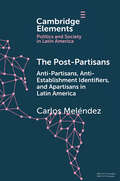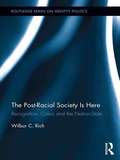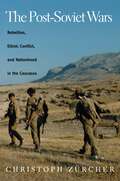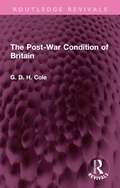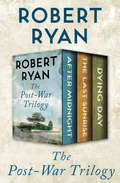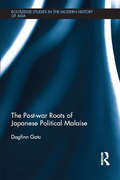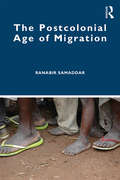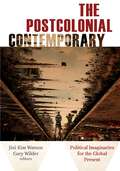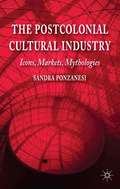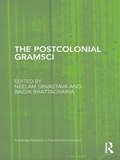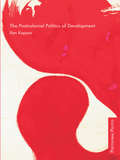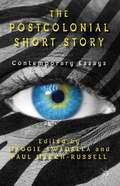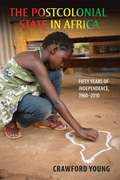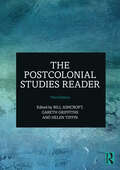- Table View
- List View
The Post-American Middle East: How the World Changed Where the War on Terror Failed
by Moosa Elayah Laurent A. LambertAfter two decades of War on Terror, it is particularly important, for both academic and policy purposes, to clearly understand why the US formidable mobilization of means and might has transformed into a such a blatant geostrategic defeat of the US and its allies in the broad Middle East. This is all the more paradoxical that the WOT achieved a series of tactical victories – such as the toppling of hostile regimes in Afghanistan, Iraq and Libya; the crippling of the national economies of enemy states by sanctions; the successful targeted killing of lead terrorist Usama Bin Laden, ISIS cult leaders Abu Bakr Al-Baghdadi and his successor, etc. So, why have these tactical victories not led to what was supposed to become, according to the US government, a ‘Greater Middle East’? With most authors being from or living in the Middle East, this book is unique as it brings perspectives and answers from the region. This is crucially important as we are entering, we argue, the era of a Post-American Middle East.Chapters 1 and 10 are available open access under a Creative Commons Attribution 4.0 International License via link.springer.com
The Post-American Presidency: The Obama Administration's War on America
by Pamela Geller Robert SpencerPopular conservative blogger Pamela Geller and New York Times bestselling author Robert Spencer sound a wake-up call for Americans to stop the Obama administration from limiting our hard-won freedoms, silencing our democratic voices, and irreparably harming America for generations to come. America is being tested in a way that she has never been tested before. Since taking the oath of office in January 2009, President Barack Obama has cheered our enemies and demoralized our allies. He is hard at work "remaking" America by destroying the free-market system and nationalizing major segments of our economy, demonizing dissent and restricting freedom of speech, turning against our longtime friends, and above all, subjecting us to the determinations of foreign authorities. In this timely and urgent battle cry, Pamela Geller, founder of the widely popular website www.AtlasShrugs.com, and New York Times bestselling author Robert Spencer team up to expose the Obama administration’s destructive agenda—largely ignored by the mainstream media—and rally Americans to protect the sovereignty of a country that is under siege by the highest levels of its own government. As Americans see their paychecks shrinking every day, Obama ignores our forefathers’ founding principle: individual rights. Instead, he seeks to level the playing field—to transform both the global and national landscape in favor of our enemies—even if it means cutting America off at the knees. He envisions himself as more than just a president of the United States, but as a shaper of the new world order, an internationalist energetically laying the groundwork for global government: the president of the world. A vital guide to helping conservatives prepare for the tough battles ahead, The Post-American Presidency critically examines the Obama administration’s ominous and revealing moves against our basic freedoms, particularly as he seizes control of the three engines of the American economy: health care, energy, and education. The Shining City on a Hill has gone dark. But America is not dead. The time is NOW to stand up and fight.
The Post-American World
by Fareed ZakariaZakaria (Time magazine editor-at-large and host of CNN's "Fareed Zakaria GPS") updates his discussion of the relative decline of American global power in order to take into account the impact of the economic crisis of the late 2000s and other recent developments, which have only accelerated the transition to the "post-American" world and the rise of new powers in Zakaria's estimation. It must be stressed that Zakaria is only predicting a relative decline in power for the United States and that he believes that the United States can maintain a healthy position in the world by more carefully balancing foreign policy priorities, pushing for broad international rules conducive to long-term US interests instead of pushing for narrow and short-term interests, seeking better relations with rising powers instead of seeking to balance against them, encouraging ad hoc multilateral approaches to global problems in lieu of the lost hegemonic order, recognizing the dangers of opponents' asymmetric power in order to avoid getting sucked into traps, and recognizing international legitimacy as a key element of national power.
The Post-American World: Release 2.0 (International Edition)
by Fareed Zakaria"A relentlessly intelligent book." --Joseph Joffe, New York Times Book Review "This is not a book about the decline of America, but rather about the rise of everyone else." So begins Fareed Zakaria's blockbuster on the United States in the twenty-first century, and the trends he identifies have proceeded faster than anyone anticipated. How might the nation continue to thrive in a truly global era? In this fully updated 2.0 edition, Zakaria answers these questions with his customary lucidity, insight, and imagination.
The Post-Cold War International System: Strategies, Institutions and Reflexivity (New International Relations)
by Ewan HarrisonThe end of the Cold War has opened up a 'real world laboratory' in which to test and refine general theories of international relations. Using the frameworks provided by structural realism, institutionalism and liberalism, The Post-Cold War International System examines how major powers responded to the collapse of the Soviet Union and developed their foreign policies over the period of post-Cold War transition. The book argues that the democratic peace has begun to generate powerful socialisation effects, due to the emergence of a critical mass of liberal democratic states since the end of the Cold War. The trend this has produced is similar to a pattern that classical realists have interpreted as 'bandwagoning' within a unipolar power structure. Case studies of Germany, China and Japan - identified as key states with the potential to challenge US dominance - provide evidence to support the assessment of international change. The author concludes by exploring the implications of September 11th for the analysis developed. This important volume argues that the end of the Cold War was a major historical turning point in the development of world politics with fundamental implications for the basic way in which the dynamics of the international system are conceptualised.
The Post-Crisis Developmental State: Perspectives from the Global Periphery (International Political Economy Series)
by Tamás Gerőcs Judit RiczThe focus of this volume is on the role of the developmental state in a situation in which a series of major crises affects the (semi-) periphery of the global economy. The authors go beyond the established debate on developmental states in East Asia by highlighting a much broader understanding of development and a very different global economic context. They also further the existing debate by covering new country cases. At the same time, they deepen our perspective on developmental states by looking at unusual sectors such as green industrial policy, education and farming.
The Post-Fordist Sexual Contract: Working and Living in Contingency
by Lisa Adkins Maryanne DeverThis collection analyzes shifting relationships between gender and labour in post-Fordist times. Contingency creates a sexual contract in which attachments to work, mothering, entrepreneurship and investor subjectivity are the new regulatory ideals for women over a range of working arrangements, and across classed and raced dimensions.
The Post-Imperial Age: a history in two volumes (The Postwar World)
by J.P.D. DunbabinThis volume looks at the impact on the wider world of the end of the European empires and their replacement by a new international order dominated by East-West rivalries. After surveying the decolonization process, the book looks successively at the different patterns of experience in Southern Africa, South East Asia and India, East Asia and the Pacific, the Middle East, and the Americas. It concludes with a sustained analysis of the International System -- the functioning of international organizations and the global role of money and trade.
The Post-Pandemic Liberal Arts College: A Manifesto for Reinvention
by Steve Volk Beth BenedixA succinct and impassioned call to reimagine and revive the small liberal arts college, by two veteran educators. Private liberal arts colleges have struggled for decades; now, as the COVID-19 pandemic widens cracks latent in many American institutions, they are facing a possibly mortal crisis. In The Post-Pandemic Liberal Arts College: A Manifesto for Reinvention, Steven Volk and Beth Benedix call for small colleges to seize this moment and reinvent themselves. With the rise of rankings that set peer institutions against each other, tuition that outpaces income, creeping pre-professionalism, and a race to build student &“customers&” the splashiest new amenities, many private liberal arts colleges have strayed from their founders&’ missions. If they could shed the mantle of exclusivity, reduce costs, facilitate true social mobility, and collaborate with each other, the authors argue, they might both survive and again become just, equitable, accessible institutions able to offer the transformative and visionary education that is their hallmark. Educators, students, parents, and anyone invested in the future of higher education should read this book.
The Post-Pandemic World and Global Politics
by A K Ullah Jannatul FerdousThe book examines the impact of COVID-19 on economic and political processes, contending that the global reaction to the pandemic has been the largest failure in scientific policy in a generation. Unlike earlier crises, it has impacted the world's leading economies while also paralyzing international ties, provoking diverse and far-reaching reactions. The authors posit that no effective global response has been launched in response to this global catastrophe. Rather, governments have implemented a variety of policies based on the costs of virus protection against financial closure and isolation. In doing so, there has been a resurgence in nationalism. This book aims to provide comprehensive understanding of how the pandemic has widened political gaps, and demarcates what the long-term consequences might be in terms of policies and economics in the wake of the pandemic. Of interest to scholars in political geography, development studies, international relations, public administration, and health science, this book presents key observations on existing theories of global politics pivoted around the COVID-19 pandemic, and its ramifications on individuals, groups, and ultimately, the nation state.
The Post-Partisans: Anti-Partisans, Anti-Establishment Identifiers, and Apartisans in Latin America (Elements in Politics and Society in Latin America)
by Carlos MeléndezWhere party identification is in decay or in flux, alternative political identifications have gained centrality. In this Element, the author develops a typology of post-partisan political identities: alternative ways in which rejection of or the absence of partisan politics are defining political identifiers or non-identifiers. Based on original evidence collected through opinion polls in different Latin American countries, as well as applying an innovative measurement, the author shows the respective magnitudes and ideological composition of anti-partisans (individuals who hold negative partisanships: strong identities based on predispositions against a specific political party or movement), anti-establishment identifiers (individuals who hold many negative partisanships simultaneously), and apartisans (individuals who lack any positive or negative partisanships). This Element demonstrates the usefulness of employing these categories in order to better understand different levels of party system institutionalization, party-building, and partisan polarization in the region.
The Post-Racial Society is Here: Recognition, Critics and the Nation-State (Routledge Series on Identity Politics)
by Wilbur C. RichIn a provocative and controversial analysis, Wilbur C. Rich’s The Post-Racial Society is Here conclusively demonstrates that nation is in midst of a post-racial society. Yet many Americans are skeptical of this fundamental social transformation. The failure of recognition is related to the remnants of the previous race-based society. Recognizing the advent of a post-racial society is not to gainsay recurrent racial incidents or a denial of the socio-economic gap between the races. Using the findings of historians and social scientists, this book outlines why the construction and deconstruction of the race-based society was such a difficult and daunting enterprise. Starting from the nation’s inception, Rich examines how the nation elites used racial language, separate schools, and the media to divide Americans. After World War II, the nation used U.S. Supreme Court rulings and the Congressional passage of Civil Rights laws to dismantle the institutional support for racial segregation and discrimination. The black Civil Rights Movement facilitated and consolidated the movement toward socio-political inclusion of African Americans. Rich alerts the reader to the unprecedented progress made and why the forces of the new global economy demand that we move faster to make society more inclusive. This thought-provocking book should interest scholars of sociology, Africana Studies, American studies and African American politics.
The Post-Soviet Wars: Rebellion, Ethnic Conflict, and Nationhood in the Caucasus
by Christoph ZurcherA brief history of the Caucusus region during and after the Post-Soviet WarsThe Post-Soviet Wars is a comparative account of the organized violence in the Caucusus region, looking at four key areas: Chechnya, Armenia, Azerbaijan, Georgia, and Dagestan. Zürcher’s goal is to understand the origin and nature of the violence in these regions, the response and suppression from the post-Soviet regime and the resulting outcomes, all with an eye toward understanding why some conflicts turned violent, whereas others not. Notably, in Dagestan actual violent conflict has not erupted, an exception of political stability for the region. The book provides a brief history of the region, particularly the collapse of the Soviet Union and the resulting changes that took place in the wake of this toppling. Zürcher carefully looks at the conditions within each region—economic, ethnic, religious, and political—to make sense of why some turned to violent conflict and some did not and what the future of the region might portend.This important volume provides both an overview of the region that is both up-to-date and comprehensive as well as an accessible understanding of the current scholarship on mobilization and violence.
The Post-War Anglo-American Far Right: A Special Relationship of Hate
by Paul Jackson Anton ShekhovtsovSince 1945 neo-Nazi and far right extremists on both sides of the Atlantic have developed rich cultures which regularly exchange ideas. Leading activists such as Colin Jordan and George Lincoln Rockwell have helped to establish what has become a complex web of marginalised extremism. This book examines the history of this milieu to the present day.
The Post-War Condition of Britain (Routledge Revivals)
by G.D.H. ColeFirst published in 1956, The Post-War Condition of Britain measures the extent of changes in Britain since the thirties. It contains more than two hundred tables on such matters as the national income, employment, production and productivity, investment and consumption; health, education, housing, and the insurance, assistance and similar services; on Trade Unions and industrial relations; class structure, political attitudes and party organizations; and the problems of local government and town and country planning. It is simply written, demanding from the reader the minimum of technical knowledge of economics or other specialized studies, and it should serve as an invaluable reference book for all who need exact information.
The Post-War Trilogy: After Midnight, The Last Sunrise, and Dying Day (The Post-War Trilogy #2)
by Robert RyanThree post–World War II adventure novels inspired by real events—from an acclaimed British author who &“skillfully blends fact with fiction&” (Time Out London). After Midnight: Ryan&’s novel, based on a true story, begins with a letter from Australian bomber pilot Bill Carr to his daughter on her first birthday in 1944. That same day, he takes off on a mission over the mountains of Northern Italy and is never heard from again. Twenty years later, Lindy Carr arrives in Italy to find out what happened to her father. Her guide is Jack Kirby, a daredevil motorcycle racer and pilot who flew Mosquito fighters in the war and spent time among the Italian partisans. What Jack and Lindy uncover in the Italian Alps will change both their lives forever. &“Ryan&’s mastery of 1940s detail and his ability to discover intriguing but unvisited byways of the war can be taken for granted; but the more recent storyline shows him equally adept at handling a 1960s setting.&” —The Sunday Times The Last Sunrise: The real history of World War II&’s most daring fighter squadron is the inspiration for this riveting novel of adventure and romance in the Far East. In 1941, Lee Crane was a Flying Tiger, one of dozens of American pilots recruited to join the Chinese Air Force in the fight against the Japanese. Wild in the air and on the ground, the Tigers broke hearts all over Burma, and Crane was no different—until he fell in love with a stunning Anglo-Indian widow. But in the chaos of war, Crane lost track of the woman of his dreams, and spent the next seven years convincing himself it wasn&’t meant to be. Now a chance encounter with another long-lost beauty has him ready to plunge back into the past, praying he will come up with a different answer this time. &“The flying scenes are brilliantly handled. Ryan&’s research is impressive. . . . Bold and successful.&” —The Sunday Times Dying Day: In this Cold War spy thriller based on actual case files, a woman is willing to do whatever it takes to bring her sister home. In the darkest days of World War II, Laura McGill and her sister, Diana, ventured behind enemy lines on behalf of Britain&’s Special Operations Executive. Now it is 1948, four years since Diana disappeared inside occupied France, and Laura has reached a point of desperation that leads her to kidnap the head clerk of the SOE at gunpoint to learn the name of the spy who ran her sister&’s last mission. That spy, James Hadley Webb, will take Laura to the divided city of Berlin, where he is waging a shadow war of influence and intrigue—and losing. Laura&’s arrival may be just what Webb needs to stop his agents from dying. &“Thrilling post war espionage action.&” —Tatler
The Post-war Roots of Japanese Political Malaise (Routledge Studies in the Modern History of Asia)
by Dagfinn GatuWritings on post-war Japanese politics have tended to take for granted the dominance of the Liberal Democratic Party (LDP) as inevitable, without questioning how this came about. This book analyses the nature of Japanese party politics over the first four decades following the Second World War, assessing how the chief contenders – the conservative LDP and the socialists JSP (Japan Socialist Party) – competed in terms of their strengths and weaknesses relative to the other. Throughout, it addresses the questions: How effectively were the parties’ strengths harnessed? How did they alter over time? To what extent was the winning formula challenged? Did the loser have access to strengths with a major potential, and, if so, why did these remain underdeveloped? It extends widely to include discussion of the political system, the social and economic environment in which parties operated, internal party matters, especially factions, personal support groups, special interest groups, and the role of government bureaucracy. It shows why the Liberal Democratic Party was dominant, why the Japan Socialist Party remained out of power, and how successive prime ministers conducted policymaking in ways which often resulted in the bureaucracy taking the lead. Overall, the book shows how precedents for the political system and for policymaking were set in this important period, precedents which continue, and which have contributed significantly to the present conservative stance on many key issues.
The Postcolonial Age of Migration
by Ranabir SamaddarThis book critically examines the question of migration that appears at the intersection of global neo-liberal transformation, postcolonial politics, and economy. It analyses the specific ways in which colonial relations are produced and reproduced in global migratory flows and their consequences for labour, human rights, and social justice. The postcolonial age of migration not only indicates a geopolitical and geo-economic division of the globe between countries of the North and those of the South marked by massive and mixed population flows from the latter to the former, but also the production of these relations within and among the countries of the North. The book discusses issues such as transborder flows among countries of the South; migratory movements of the internally displaced; growing statelessness leading to forced migration; border violence; refugees of partitions; customary and local practices of care and protection; population policies and migration management (both emigration and immigration); the protracted nature of displacement; labour flows and immigrant labour; and the relationships between globalisation, nationalism, citizenship, and migration in postcolonial regions. It also traces colonial and postcolonial histories of migration and justice to bear on the present understanding of local experiences of migration as well as global social transformations while highlighting the limits of the fundamental tenets of humanitarianism (protection, assistance, security, responsibility), which impact the political and economic rights of vast sections of moving populations. Topical and an important intervention in contemporary global migration and refugee studies, the book offers new sources, interpretations, and analyses in understanding postcolonial migration. It will be useful to scholars and researchers of migration studies, refugee studies, border studies, political studies, political sociology, international relations, human rights and law, human geography, international politics, and political economy. It will also interest policymakers, legal practitioners, nongovernmental organisations, and activists.
The Postcolonial Contemporary: Political Imaginaries for the Global Present
by Jini Kim Watson and Gary Wilder, EditorsThis volume invokes the “postcolonial contemporary” in order to recognize and reflect upon the emphatically postcolonial character of the contemporary conjuncture, as well as to inquire into whether postcolonial criticism can adequately grasp it. Neither simply for nor against postcolonialism, the volume seeks to cut across this false alternative, and to think with postcolonial theory about political contemporaneity.Many of the most influential frameworks of postcolonial theory were developed during the 1970s and 1990s, during what we may now recognize as the twilight of the postwar period. If forms of capitalist imperialism are entering into new configurations of neoliberal privatization, wars-without-end, xenophobic nationalism and unsustainable extraction, what aspects of postcolonial inquiry must be reworked or revised in order to grasp our political present?In twelve essays that draw from a number of disciplines—history, anthropology, literature, geography, indigenous studies— and regional locations (the Black Atlantic, South Africa, South Asia, East Asia, Australia, Argentina) The Postcolonial Contemporary seeks to move beyond the habitual oppositions that have often characterized the field, such as universal vs. particular; Marxism vs. postcolonialism; and politics vs. culture. These essays signal an attempt to reckon with new and persisting postcolonial predicaments and do so under four inter-related analytics: Postcolonial Temporality; Deprovincializing the Global South; Beyond Marxism versus Postcolonial Studies; and Postcolonial Spatiality and New Political Imaginaries.
The Postcolonial Cultural Industry
by Sandra PonzanesiThe Postcolonial Cultural Industry makes a timely intervention into the field of postcolonial studies by unpacking its relation to the cultural industry. It unearths the role of literary prizes, the adaptation industry and the marketing of ethnic bestsellers as new globalization strategies that connect postcolonial artworks to the market place.
The Postcolonial Gramsci (Routledge Research in Postcolonial Literatures)
by Neelam Srivastava Baidik BhattacharyaThe importance of Antonio Gramsci’s work for postcolonial studies can hardly be exaggerated, and in this volume, contributors situate Gramsci's work in the vast and complex oeuvre of postcolonial studies. Specifically, this book endeavors to reassess the impact on postcolonial studies of the central role assigned by Gramsci to culture and literature in the formation of a truly revolutionary idea of the national—a notion that has profoundly shaped the thinking of both Frantz Fanon and Edward Said. Gramsci, as Iain Chambers has argued, has been instrumental in helping scholars rethink their understanding of historical, political, and cultural struggle by substituting the relationship between tradition and modernity with that of subaltern versus hegemonic parts of the world. Combining theoretical reflections and re-interpretations of Gramsci, the scholars in this collection present comparative geo-cultural perspectives on the meaning of the subaltern, passive revolution, hegemony, and the concept of national-popular culture in order to chart out a political map of the postcolonial through the central focus on Gramsci.
The Postcolonial Politics of Development (Postcolonial Politics)
by Ilan KapoorThis book uses a postcolonial lens to question development’s dominant cultural representations and institutional practices, investigating the possibilities for a transformatory postcolonial politics. Ilan Kapoor examines recent development policy initiatives in such areas as ‘governance,’ ‘human rights’ and ‘participation’ to better understand and contest the production of knowledge in development - its cultural assumptions, power implications, and hegemonic politics. The volume shows how development practitioners and westernized elites/intellectuals are often complicit in this neo-colonial knowledge production. Noble gestures such as giving foreign aid or promoting participation and democracy frequently mask their institutional biases and economic and geopolitical interests, while silencing the subaltern (marginalized groups), on whose behalf they purportedly work. In response, the book argues for a radical ethical and political self-reflexivity that is vigilant to our reproduction of neo-colonialisms and amenable to public contestation of development priorities. It also underlines subaltern political strategies that can (and do) lead to greater democratic dialogue.
The Postcolonial Short Story
by Maggie Awadalla Paul March-RussellThis book puts the short story at the heart of contemporary postcolonial studies and questions what postcolonial literary criticism may be. Focusing on short fiction between 1975 and today - the period in which critical theory came to determine postcolonial studies - it argues for a sophisticated critique exemplified by the ambiguity of the form.
The Postcolonial State in Africa
by Crawford YoungIn The Postcolonial State in Africa, Crawford Young offers an informed and authoritative comparative overview of fifty years of African independence, drawing on his decades of research and first-hand experience on the African continent.
The Postcolonial Studies Reader
by Bill Ashcroft, Gareth Griffiths and Helen TiffinThe most comprehensive collection of postcolonial writing theory and criticism, this third edition has been thoroughly revised and updated to include 125 extracts from key works in the field.Leading, as well as lesser-known figures in the fields of writing, theory and criticism contribute to this inspiring body of work that includes sections on nationalism, hybridity, diaspora and globalisation. As in the first two editions, this new edition of The Postcolonial Studies Reader ranges as widely as possible to reflect the remarkable diversity of work in the discipline and the vibrancy of anti-imperialist and decolonising writing both within and without the metropolitan centres.This volume includes new work in the field over the decade and a half since the second edition was published. Covering more debates, topics and critics than any comparable book in its field The Postcolonial Studies Reader provides the ideal starting point for students and issues a potent challenge to the ways in which we think and write about literature and culture.
